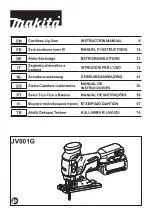
RIVING KNIFE POSITION AND ALIGNMENT
FIGURE 41
MOVING THE SAW
Once the saw is removed from the stand, it is recommended that
the saw be moved using two people. A possible carry point is the
handle located on the right side of the saw. As seen in Figure 41.
OPERATION
Failure to comply with the following warnings may result in serious personal injury.
READ ENTIRE MANUAL. In addition to reading these operating instructions, it is important to read and understand the entire manual
before operating this saw. Follow all applicable instructions regarding assembly, preparation, and adjustment prior to making any cuts
and comply with all safety rules and warnings in this section and elsewhere throughout this manual.
1.
Each time you use the saw, run through the following
checklist:
• Are the power source and power connections adequate for
the saw?
• Are the saw and work area free of clutter and by-standers?
• Is the blade tight and properly aligned?
• Does the riving knife thickness match the blade?
• Are the blade and riving knife properly aligned?
•
Is the operator qualified to make the cut and familiar with
all of the relevant safety rules, warnings and instructions
included in this manual?
•
Is the operator and everyone in proximity to the saw
wearing appropriate eye, hearing and respiratory
equipment?
• Are the bevel angle and height adjustment knobs locked in
the proper position?
• Make sure the blade is the proper height for your cutting
operation.
• If ripping, is the rip fence parallel to the blade and securely
locked in position?
• If crosscutting, is the miter gauge knob tight?
• If making through cuts with a standard blade, are the
blade guard, riving knife and anti-kickback pawls properly
attached and properly functioning with both guards
contacting the table surface?
• Is there proper clearance and support for the workpiece as
it leaves the blade?
• Are any cutting aids needed? If so, are they in place, or
within reach for proper use?
2.
The use of attachments and accessories not recommended
by Ridgid
®
may result in injury.
3.
Replace or sharpen the anti-kick pawls when the points
become dull.
4.
Make sure saw is stable and cutting can be accomplished
without tipping the saw. Do not attempt to cut large
workpieces without securing saw to a stable surface.
5.
Never use the fence and miter gauge together without using
a cutoff block as as described in the manual.
6.
The proper throat plate must be in place at all times.
7.
If your saw makes an unfamiliar noise or if it vibrates
excessively, cease operating immediately until the source has
been located and the problem corrected.
Use saw blade guard, anti-kickback pawls, and riving knife
assembly for every possible operation, including all through-cut
sawing.
Push the workpiece past the saw blade prior to releasing control.
NEVER rip a workpiece that is twisted or warped, or does not
have a straight edge to guide along the fence.
NEVER saw a large workpiece that cannot be controlled.
NEVER use the fence as a guide or length stop when
crosscutting.
NEVER saw a workpiece with loose knots, flaws, nails or other
foreign objects.
NEVER rip a workpiece shorter than 10 inches (254mm).
NEVER use a dull blade. A dull blade should be replaced or
re-sharpened.
Never perform freehand cutting, plunge cutting, re-sawing or
cove cutting.
27













































